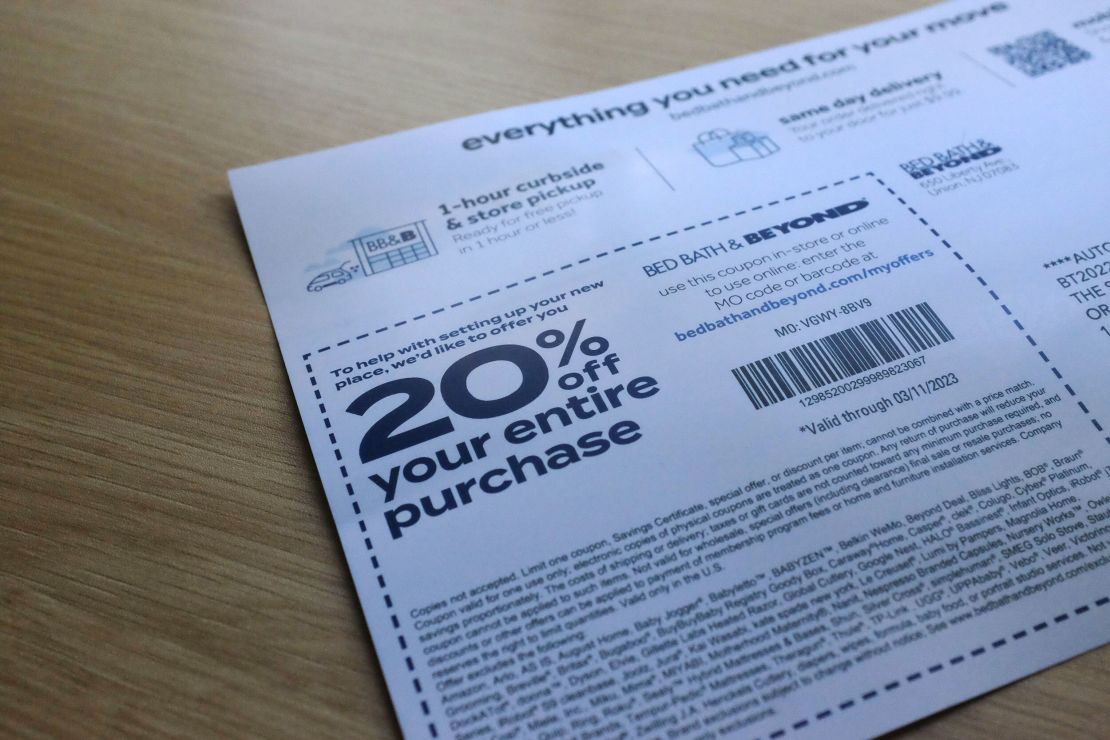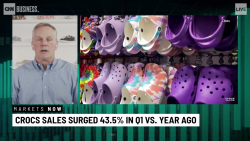After a tumultuous struggle to stay in business over the past several years, Bed Bath & Beyond declared bankruptcy on Sunday. That means your stash of its 20%-off coupons are about to be useless.
Bed Bath & Beyond said it would sell off its merchandise and then go out of business. The company said customers will have Sunday, Monday and Tuesday to use their remaining 20%-off coupons.
The company will stop accepting coupons on Wednesday. Instead, Bed Bath & Beyond expects to offer “deep discounts” on its products as part of its going-out-of-business sales.
“Creditors wouldn’t want to allow shoppers to tack on those 20%-off coupons on top of 70% off liquidation prices,” said Burt Flickinger, retail expert and managing director of retail consultancy Strategic Resource Group.
The company encouraged shoppers to seek out its discounted merchandise later this week, but those sales come with big caveats: Items purchased before Wednesday can be returned until May 24, but all sales after Wednesday will be final. The store will stop accepting gift cards on May 8, and the brands Welcome Rewards points will stop being accepted on May 15. Bed Bath & Beyond said it will no longer award points to customers for purchases, starting Sunday.
Bed Bath & Beyond, a staple of wedding registries for years, said customers who registered with Bed Bath & Beyond will eventually have their information transferred to a competitor’s service, where guests can purchase similar items. The company expects to notify customers about its registry plans in the coming days.
Other retailers have followed a similar game plan after bankruptcy and store closings.
Toys ‘R’ Us honored its gift cards, store credit and coupons for a 30-day period after it filed for bankruptcy in 2017, and subsequently liquidated its US business. The toy seller has since begun to attempt a comeback through a partnership with Macy’s, and opened its first post-bankruptcy store in 2019 under new ownership.
It’s not just creditors who might take issue with the store honoring the coupons on top of liquidation discounts. The companies that sell the products wouldn’t want their merchandise knocked down so heavily, either.
“For suppliers of name brands in particular, they wouldn’t want the deep discounting to negatively impact their brand image,” said Ali Besharat, associate professor of marketing and co-director of the Consumer Insights and Business Innovation Center at the University of Denver’s Daniels College of Business.
Big Blue became a company icon
Bed Bath & Beyond introduced its oversized coupon for 20% off a single item three decades ago.
Over time, the oversized postcard-like mailer and digital coupon with an eye-popping purple-blue border and font blaring “20% off in-store or online” developed a cult following and became a successful marketing strategy to lure in repeat shoppers, said Flickinger.

The “Big Blue” coupons became a pop culture reference as celebrities and late-night talk show hosts popped it into their on-air conversations.
Rumors swirled on various social platforms that Big Blue coupons never expire, even though the weekly coupon does feature an expiration date.
Then the pandemic hit and walloped the retail industry. With stores closed for months, and consumers rethinking their nonessential purchases, Bed Bath & Beyond sales and profit took a hit. In late 2020, the retailer said it was scaling back on its popular coupon program to boost its business.
Two years later, company executives called the move a ‘big mistake,” admitting they had misjudged how much shoppers had come to embrace the regular cadence of the Big Blue coupons.
Now that the company is going through a liquidation process, Bed Bath & Beyond said it’s the end of the road for the coupons.
“Since the company no longer exists … the points would simply be useless,” said Chandan Jha, associate professor of finance at Le Moyne College in Syracuse, NY.

























